Ford Transit Bus vs Mercedes GLB – Differences & prices compared
Two cars, one duel: Ford Transit Bus meets Mercedes GLB.
Which one wins in performance, efficiency and value for money? Find out now!
Costs and Efficiency:
Price and efficiency are often the first things buyers look at. Here it becomes clear which model has the long-term edge – whether at the pump, the plug, or in purchase price.
Mercedes GLB has a distinct advantage in terms of price – it starts at 40500 £, while the Ford Transit Bus costs 50500 £. That’s a price difference of around 9991 £.
Fuel consumption also shows a difference: Mercedes GLB manages with 5.60 L and is therefore convincingly more efficient than the Ford Transit Bus with 9.40 L. The difference is about 3.80 L per 100 km.
Engine and Performance:
Under the bonnet, it becomes clear which model is tuned for sportiness and which one takes the lead when you hit the accelerator.
When it comes to engine power, the Mercedes GLB has a clearly edge – offering 320 HP compared to 150 HP. That’s roughly 170 HP more horsepower.
There’s also a difference in torque: Mercedes GLB pulls hardly perceptible stronger with 400 Nm compared to 390 Nm. That’s about 10 Nm difference.
Space and Everyday Use:
Beyond pure performance, interior space and usability matter most in daily life. This is where you see which car is more practical and versatile.
Seats: Ford Transit Bus offers significantly more seating capacity – 9 vs 5.
In curb weight, Mercedes GLB is significantly lighter – 1640 kg compared to 2338 kg. The difference is around 698 kg.
In terms of boot space, the Mercedes GLB offers decisively more room – 570 L compared to 0 L. That’s a difference of about 570 L.
When it comes to payload, Ford Transit Bus convincingly takes the win – 1162 kg compared to 500 kg. That’s a difference of about 662 kg.
Who comes out on top?
Overall, the Mercedes GLB shows itself to be leaves the rival little chance and secures the title of DriveDuel Champion.
It convinces with the more balanced overall package and proves to be the more versatile choice for everyday use.
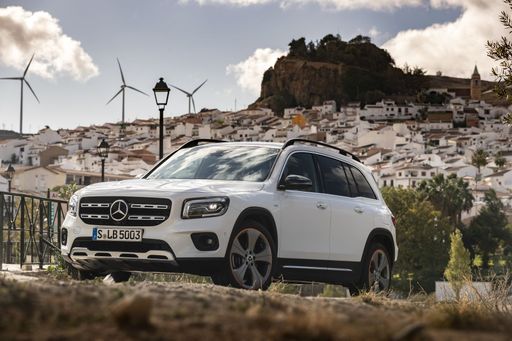 @ Mercedes-Benz Group Media
@ Mercedes-Benz Group Media
Mercedes GLB
Ford Transit Bus
The Ford Transit Bus is renowned for its robust performance and spacious interior, making it an ideal choice for both commercial and personal use. With its efficient handling and modern design, it effortlessly combines practicality with comfort. Its adaptability and versatility ensure it meets the demands of various driving needs, from urban transport to long-distance journeys.
details @ Ford Motor Company / Ford Media Center
@ Ford Motor Company / Ford Media Center
 @ Ford Motor Company / Ford Media Center
@ Ford Motor Company / Ford Media Center
 @ Ford Motor Company / Ford Media Center
@ Ford Motor Company / Ford Media Center
Mercedes GLB
The Mercedes GLB is a practical compact SUV that mixes boxy, family-friendly space with premium German polish, making it an appealing choice for buyers who want usefulness without pretension. It drives with a confident, composed feel and somehow manages to look both rugged and refined — the grown-up SUV that still likes to have fun.
details @ Mercedes-Benz Group Media
@ Mercedes-Benz Group Media
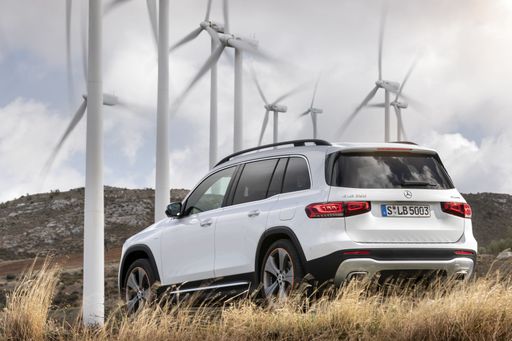 @ Mercedes-Benz Group Media
@ Mercedes-Benz Group Media
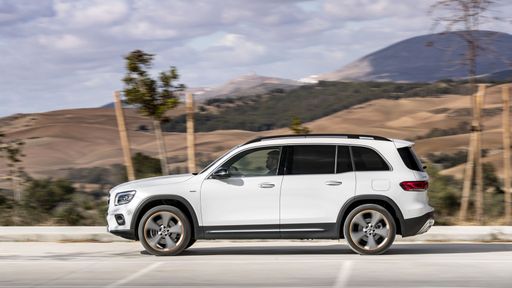 @ Mercedes-Benz Group Media
@ Mercedes-Benz Group Media
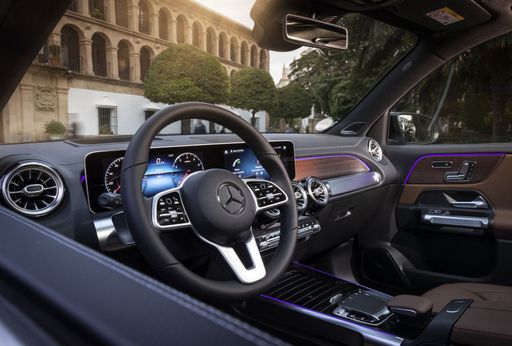 @ Mercedes-Benz Group Media
@ Mercedes-Benz Group Media
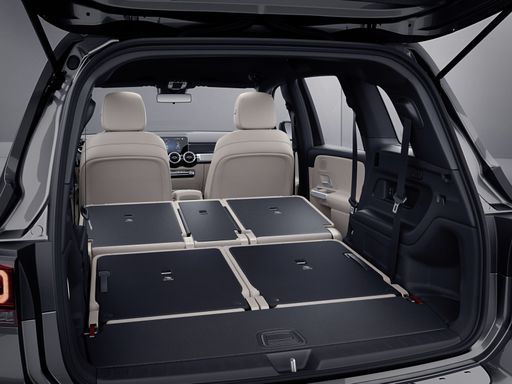 @ Mercedes-Benz Group Media
@ Mercedes-Benz Group Media
 @ Ford Motor Company / Ford Media Center
@ Ford Motor Company / Ford Media Center
|
 @ Mercedes-Benz Group Media
@ Mercedes-Benz Group Media
|
|
|
|
Costs and Consumption |
|
|---|---|
|
Price
50500 - 52900 £
|
Price
40500 - 65300 £
|
|
Consumption L/100km
9.4 - 9.5 L
|
Consumption L/100km
5.6 - 9 L
|
|
Consumption kWh/100km
-
|
Consumption kWh/100km
-
|
|
Electric Range
-
|
Electric Range
-
|
|
Battery Capacity
-
|
Battery Capacity
-
|
|
co2
245 - 248 g/km
|
co2
146 - 204 g/km
|
|
Fuel tank capacity
70 L
|
Fuel tank capacity
52 - 60 L
|
Dimensions and Body |
|
|---|---|
|
Body Type
Bus
|
Body Type
SUV
|
|
Seats
9
|
Seats
5
|
|
Doors
4
|
Doors
5
|
|
Curb weight
2338 - 2385 kg
|
Curb weight
1640 - 1820 kg
|
|
Trunk capacity
0 L
|
Trunk capacity
565 - 570 L
|
|
Length
5531 - 5981 mm
|
Length
4634 - 4650 mm
|
|
Width
2059 mm
|
Width
1834 - 1850 mm
|
|
Height
2530 - 2533 mm
|
Height
1665 - 1692 mm
|
|
Max trunk capacity
-
|
Max trunk capacity
1800 - 1805 L
|
|
Payload
1115 - 1162 kg
|
Payload
500 kg
|
Engine and Performance |
|
|---|---|
|
Engine Type
Diesel
|
Engine Type
Petrol MHEV, Diesel
|
|
Transmission
Automatic
|
Transmission
Automatic
|
|
Transmission Detail
Automatic Gearbox
|
Transmission Detail
Dual-Clutch Automatic
|
|
Drive Type
Front-Wheel Drive
|
Drive Type
Front-Wheel Drive, All-Wheel Drive
|
|
Power HP
130 - 150 HP
|
Power HP
116 - 320 HP
|
|
Acceleration 0-100km/h
-
|
Acceleration 0-100km/h
5.5 - 11.5 s
|
|
Max Speed
-
|
Max Speed
188 - 250 km/h
|
|
Torque
360 - 390 Nm
|
Torque
230 - 400 Nm
|
|
Number of Cylinders
4
|
Number of Cylinders
4
|
|
Power kW
96 - 110 kW
|
Power kW
85 - 235 kW
|
|
Engine capacity
1996 cm3
|
Engine capacity
1332 - 1991 cm3
|
General |
|
|---|---|
|
Model Year
2024
|
Model Year
2025
|
|
CO2 Efficiency Class
G
|
CO2 Efficiency Class
E, F, G
|
|
Brand
Ford
|
Brand
Mercedes-Benz
|
What drivetrain options does the Ford Transit Bus have?
Available configurations include Front-Wheel Drive.
The prices and data displayed are estimates based on German list prices and may vary by country. This information is not legally binding.
